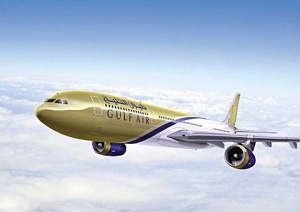Gulf Air unveils new strategy to stem losses

Gulf Air has announced a new strategy to turn itself into a commercially sustainable business in 2012. The strategy will focus on expanding its network with 20 new networks and upgrading its fleet. However it will also cut up to fifteen other routes and close some overseas offices in a bid to curb losses.
Mr Talal Al Zain, Gulf Air Chairman and Chief Executive of Mumtalakat, the investment company for the Kingdom of Bahrain, which owns the airline, said: “We have a clear mandate: to build an efficient, commercially sustainable and dynamic airline that effectively serves the people and the economy of Bahrain and represents the Kingdom on the world stage.”
He added, “At the moment Gulf Air currently relies on significant Government support, spending far more than it earns. This is clearly unsustainable and the funds could be invested into other important areas of the national economy.”
Mr. Samer Majali, Gulf Air’s Chief Executive Officer, said: “For the first time, Gulf Air will focus specifically on Bahrain, serving the Kingdom with higher frequency, non stop services to more destinations across three continents. We will also provide better services to some of the world’s leading financial markets, helping to support Bahrain’s significant financial services sector.”
The new destinations will cover the Middle East, Africa, Asia and Europe. This will consolidate and expand its existing position as the carrier with the largest number of Middle East connections through its efficient Bahrain Airport hub.
ADVERTISEMENT
It will also suspend up to fifteen other routes and close a number of overseas stations that are not profitable. This will include the airline’s current operations to Shanghai, Hyderabad and Bangalore.
Gulf Air will also introduce a number of new product innovations, seating arrangements, in-flight entertainment and other on-board amenities, tailored to the Middle East region on a consistent basis. It will also aim to reduce fleet costs and minimise expenditure that no longer adds customer value.
The airline will also continue to improve its operational efficiency and reliability by investing in new aircraft. The fleet composition will focus primarily on narrow-body aircraft and regional jets, including a number of long-range narrow-body aircraft which will connect Bahrain to key financial centers in Europe and Asia.
The strategic plan will necessitate a substantial increase in our current requirement for narrow-body aircraft beyond the fifteen ordered A320s, three of which have already been delivered, whilst reducing the requirement for wide-body aircraft. The company is also considering the introduction of regional jet aircraft on the short range routes from Bahrain as early as next year. It could also sell off five of our A340s and the disposal of certain other aircraft that have become surplus to requirements.
The targeted three year transition programme is split into two main parts. Phase 1 will be undertaken over the next six to twelve months and will focus on re-aligning the existing network to match market demand. Phase 2 will be undertaken in the second and third years and will focus on growing into new markets where there is identified growth potential, supported by the introduction of a compelling new range of products and services.
Mr Talal Al Zain added: “We estimate this programme will save the Government of Bahrain up to BD 1 billion (US$2.65 billion) in direct support over the next five years. That is the equivalent of BD400 per Bahraini national per year. If we do not implement this programme, Gulf Air will continue to be an unacceptable burden on the national economy. No Government, business or individual can continue to spend more money than it earns over a continued period of time. Gulf Air is no exception.”

